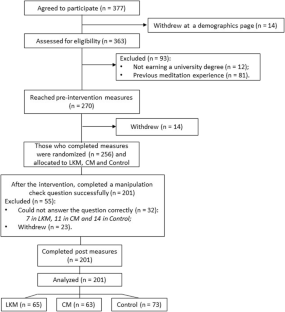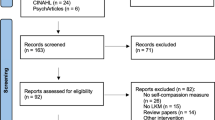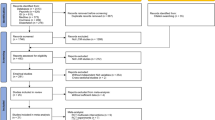Abstract
Objectives
Despite being often overlapped and used interchangeably in academic literature, loving-kindness meditation (LKM) and compassion meditation (CM) are also seen to have their distinct features. As a differential approach towards LKM and CM can promote a more accurate integration of these practices into the clinical field, it is worth studying their differential effects. The present preregistered study, thus, aimed to experimentally compare effects of single-session LKM and CM on first-time practitioners’ emotions.
Methods
Two hundred and one university students were randomly allocated to three (LKM, CM, and control) groups. The self-reported emotions were measured twice, before and after completing an assigned task.
Results
Both LKM and CM significantly increased other-focused positive emotions, compared with the control condition. Both LKM and CM increased happiness and overall positive emotions and decreased sadness; however, the effect sizes of LKM were consistently larger compared to those of CM. Both LKM and CM significantly increased low arousal positive emotions, compared with the control condition.
Conclusions
LKM and CM represent two theoretically different practices. However, as they belong to the same tradition of meditation, they are similar in their intention of forming positive wishes towards self and others, and this appeared to have a positive effect on practitioners’ emotional experience. At the same time, LKM was found to be more effective in evoking positive emotions in first-time practitioners, compared with CM.


Similar content being viewed by others
Data Availability
All data are available at the Open Science Framework (https://osf.io/6dk9g/).
References
Arguel, A., Lockyer, L., Chai, K., Pachman, M., & Lipp, O. V. (2019). Puzzle-solving activity as an indicator of epistemic confusion. Frontiers in Psychology, 10, 163. https://doi.org/10.3389/fpsyg.2019.00163.
Braehler, C., Gumley, A., Harper, J., Wallace, S., Norrie, J., & Gilbert, P. (2013). Exploring change processes in compassion focused therapy in psychosis: results of a feasibility randomized controlled trial. British Journal of Clinical Psychology, 52(2), 199–214. https://doi.org/10.1111/bjc.12009.
Brooker, H., Wesnes, K. A., Ballard, C., Hampshire, A., Aarsland, D., Khan, Z., Stenton, R., McCambridge, L., & Corbett, A. (2019). An online investigation of the relationship between the frequency of word puzzle use and cognitive function in a large sample of older adults. International Journal of Geriatric Psychiatry, 34(7), 921–931. https://doi.org/10.1002/gps.5033.
Buddhaghosa, H. (2010). The path of purification (Visuddhimaga). Kandy: Buddhist Publication Society.
Campos, D., Cebolla, A., Quero, S., Bretón-López, J., Botella, C., Soler, J., García-Campayo, J., Demarzo, M., & Baños, R. M. (2016). Meditation and happiness: mindfulness and self-compassion may mediate the meditation–happiness relationship. Personality and Individual Differences, 93, 80–85. https://doi.org/10.1016/j.paid.2015.08.040.
Carson, J. W., Keefe, F. J., Lynch, T. R., Carson, K., Goli, V., Fras, A. M., & Thorp, S. R. (2005). Loving-kindness meditation for chronic low back pain. Journal of Holistic Nursing, 23(3), 287–304. https://doi.org/10.1177/0898010105277651.
Cheng, F. K., & Tse, S. (2015). Applying the Buddhist four immeasurables to mental health care: a critical review. Journal of Religion & Spirituality in Social Work: Social Thought, 34(1), 24–50. https://doi.org/10.1080/15426432.2014.921128.
Dalai Lama, D. (2001). An open heart. London: Hodder and Stoughton.
Dalai Lama, D., & Ekman, P. (2008). Emotional awareness: overcoming the obstacles to psychological balance and compassion. New York, NY: Holt Paperbacks.
Danucalov, M. A., Kozasa, E. H., Afonso, R. F., Galduroz, J. C., & Leite, J. R. (2017). Yoga and compassion meditation program improve quality of life and self-compassion in family caregivers of Alzheimer’s disease patients: A randomized controlled trial. Geriatrics and Gerontology International, 17(1), 85–91. https://doi.org/10.1111/ggi.12675.
Dunne, J. D., Thompson, E., & Schooler, J. (2020). Mindful meta-awareness: sustained and non-propositional. Current Opinion in Psychology, 28(8), 307–311. https://doi.org/10.1016/j.copsyc.2019.07.003.
Emmanuel, S. M. (2013). A companion to Buddhist philosophy. Malden: Wiley-Blackwell.
Feldman, G., Greeson, J., & Senville, J. (2010). Differential effects of mindful breathing, progressive muscle relaxation, and loving-kindness meditation on decentering and negative reactions to repetitive thoughts. Behaviour Research and Therapy, 48(10), 1002–1011. https://doi.org/10.1016/j.brat.2010.06.006.
Feliu-Soler, A., Pascual, J. C., Elices, M., Martín-Blanco, A., Carmona, C., Cebolla, A., Simón, V., & Soler, J. (2017). Fostering self-compassion and loving-kindness in patients with borderline personality disorder: a randomized pilot study. Clinical Psychology & Psychotherapy, 24(1), 278–286. https://doi.org/10.1002/cpp.2000.
Fiebert, M. S., & Mead, T. M. (1981). Meditation and academic performance. Perceptual and Motor Skills, 53(2), 447–450. https://doi.org/10.2466/pms.1981.53.2.447.
Fredrickson, B. L., Tugade, M. M., Waugh, C. E., & Larkin, G. R. (2003). What good are positive emotions in crisis? A prospective study of resilience and emotions following the terrorist attacks on the United States on September 11th, 2001. Journal of Personality and Social Psychology, 84(2), 365–376. https://doi.org/10.1037/0022-3514.84.2.365.
Fredrickson, B. L., Cohn, M. A., Coffey, K. A., Pek, J., & Finkel, S. M. (2008). Open hearts build lives: positive emotions, induced through loving-kindness meditation, build consequential personal resources. Journal of Personality and Social Psychology, 95(5), 1045–1062. https://doi.org/10.1037/a0013262.
Germer, C. K., & Neff, K. D. (2013). Self-compassion in clinical practice. Journal of Clinical Psychology, 69(8), 856–867. https://doi.org/10.1002/jclp.22021.
Gilbert, P. (2000). Social mentalities: internal ‘social’ conflicts and the role of inner warmth and compassion in cognitive therapy. In P. Gilbert & K. G. Bailey (Eds.), Genes on the couch: Explorations in evolutionary psychotherapy (pp. 118–150). Hove: Psychology Press.
Gilbert, P. (2009). Introducing compassion-focused therapy. Advances in Psychiatric Treatment, 15(3), 199–208. https://doi.org/10.1192/apt.bp.107.005264.
Gilbert, P. (2010). Compassion focused therapy. London: Routledge.
Gilbert, P., & Choden. (2014). Mindful compassion: how the science of compassion can help you understand your emotions, live in the present, and connect deeply with others. Oakland: New Harbinger Publications.
Gilbert, P., & Procter, S. (2006). Compassionate mind training for people with high shame and self-criticism: overview and pilot study of a group therapy approach. Clinical Psychology & Psychotherapy, 13(6), 353–379. https://doi.org/10.1002/cpp.507.
Gilbert, P., Basran, J., MacArthur, M., & Kirby, J. N. (2019). Differences in the semantics of prosocial words: an exploration of compassion and kindness. Mindfulness, 10, 2259–2271. https://doi.org/10.1007/s12671-019-01191-x.
Graser, J., & Stangier, U. (2018). Compassion and loving-kindness meditation: an overview and prospects for the application in clinical samples. Harvard Review of Psychiatry, 26(4), 201–215. https://doi.org/10.1097/HRP.0000000000000192.
Grossman, P., & Van Dam, N. T. (2011). Mindfulness, by any other name…: trials and tribulations of sati in Western psychology and science. Contemporary Buddhism, 12(1), 219–239. https://doi.org/10.1080/14639947.2011.564841.
He, X., Shi, W., Han, X., Wang, N., Zhang, N., & Wang, X. (2015). The interventional effects of loving-kindness meditation on positive emotions and interpersonal interactions. Neuropsychiatric Disease and Treatment, 11, 1273–1277. https://doi.org/10.2147/NDT.S79607.
Hofmann, S. G. (2016). Emotion in therapy: from science to practice. New York: The Guilford Press.
Hofmann, S. G., Grossman, P., & Hinton, D. E. (2011). Loving-kindness and compassion meditation: potential for psychological interventions. Clinical Psychology Review, 31(7), 1126–1132. https://doi.org/10.1016/j.cpr.2011.07.003.
Hutcherson, C. A., Seppala, E. M., & Gross, J. J. (2008). Loving-kindness meditation increases social connectedness. Emotion, 8(5), 720–724. https://doi.org/10.1037/a0013237.
Ilies, I.-A., Egan, H., & Mantzios, M. (2019). Comparing state anxiety and mindfulness between mindfulness and loving-kindness meditation whilst controlling for the effect of altruism and boredom. Current Issues in Personality Psychology, 7(2), 109–119. https://doi.org/10.5114/cipp.2019.85412.
Johnson, S. B., Goodnight, B. L., Zhang, H., Daboin, I., Patterson, B., & Kaslow, N. J. (2017). Compassion-based meditation in African Americans: self-criticism mediates changes in depression. Suicide and Life-threatening Behavior, 48(2), 160–168. https://doi.org/10.1111/sltb.12347.
Kearney, D. J., McManus, C., Malte, C. A., Martinez, M. E., Felleman, B., & Simpson, T. L. (2014). Loving-kindness meditation and the broaden-and-build theory of positive emotions among veterans with posttraumatic stress disorder. Medical Care, 52, S32–S38. https://doi.org/10.1097/MLR.0000000000000221.
Kelly, A. C., Wisniewski, L., Martin-Wagar, C., & Hoffman, E. (2017). Group-based compassion-focused therapy as an adjunct to outpatient treatment for eating disorders: a pilot randomized controlled trial. Clinical Psychology & Psychotherapy, 24(2), 475–487. https://doi.org/10.1002/cpp.2018.
Kemper, K. J., McClafferty, H., Wilson, P. M., Serwint, J. R., Batra, M., Mahan, J. D., Schubert, C. J., Staples, B. B., & Schwartz, A. (2019). Do mindfulness and self-compassion predict burnout in pediatric residents? Academic Medicine, 94(6), 876–884. https://doi.org/10.1097/ACM.0000000000002546.
Kirby, J. (2016). Compassion interventions: the programmes, the evidence, and implications for research and practice. Psychology and Psychotherapy: Theory, Research and Practice, 90(3), 432–455. https://doi.org/10.1111/papt.12104.
Koopmann-Holm, B., Sze, J., Ochs, C., & Tsai, J. L. (2013). Buddhist-inspired meditation increases the value of calm. Emotion, 13(3), 497–505. https://doi.org/10.1037/a0031070.
Lang, P. J. (1980). Behavioral treatment and bio-behavioral assessment: computer applications. In J. B. Sidowski, J. H. Johnson, & T. A. Williams (Eds.), Technology in mental health care delivery systems (pp. 119–137). Norwood: Ablex.
Le Nguyen, K. D., Lin, J., Algoe, S. B., Brantley, M. M., Kim, S. L., Brantley, J., Salzberg, S., & Fredrickson, B. L. (2019). Loving-kindness meditation slows biological aging in novices: evidence from a 12-week randomized controlled trial. Psychoneuroendocrinology, 108(10), 20–27. https://doi.org/10.1016/j.psyneuen.2019.05.020.
Leaviss, J., & Uttley, L. (2015). Psychotherapeutic benefits of compassion-focused therapy: an early systematic review. Psychological Medicine, 45(5), 927–945. https://doi.org/10.1017/S0033291714002141.
Lemay, V., Hoolahan, J., & Buchanan, A. (2019). Impact of a yoga and meditation intervention on students’ stress and anxiety levels. American Journal of Pharmaceutical Education, 83(5), 747–752. https://doi.org/10.5688/ajpe7001.
Lin, J. W., & Mai, L. J. (2016). Impact of mindfulness meditation intervention on academic performance. Innovations in Education and Teaching International, 55(3), 366–375. https://doi.org/10.1080/14703297.2016.1231617.
Lotan, G., Tanay, G., & Bernstein, A. (2013). Mindfulness and distress tolerance: relations in a mindfulness preventive intervention. International Journal of Cognitive Therapy, 6(4), 371–385. https://doi.org/10.1521/ijct.2013.6.4.371.
Luberto, C. M., Shinday, N., Song, R., Philpotts, L. L., Park, E. R., Fricchione, G. L., & Yeh, G. Y. (2018). A systematic review and meta-analysis of the effects of meditation on empathy, compassion, and prosocial behaviors. Mindfulness, 9, 708–724. https://doi.org/10.1007/s12671-017-0841-8.
Lv, J., Liu, Q., Zeng, X., Oei, T. P. S., Liu, Y., Xu, K., Sun, W., Hou, H., & Liu, J. (2020). The effect of four immeasurables meditations on depressive symptoms: a systematic review and meta-analysis. Clinical Psychology Review, 76, 101814. https://doi.org/10.1016/j.cpr.2020.101814.
Neff, K. D. (2011). Self-compassion: the proven power of being kind to yourself. New York, NY: Harper Collins.
Neff, K. D. (2015). The five myths of self-compassion. Psychotherapy Networker, 39, 30–35.
Noorbala, F., Borjali, A., Ahmadian-Attari, M. M., & Noorbala, A. A. (2013). Effectiveness of compassionate mind training on depression, anxiety, and self-criticism in a group of Iranian depressed patients. Iranian Journal of Psychiatry, 8(3), 113–117.
Norris, C. J., Creem, D., Hendler, R., & Kober, H. (2018). Brief mindfulness meditation improves attention in novices: evidence from ERPs and moderation by neuroticism. Frontiers in Human Neuroscience, 12, 315. https://doi.org/10.3389/fnhum.2018.00315.
Rao, N., & Kemper, K. J. (2017). Online training in specific meditation practices improves gratitude, well-being, self-compassion, and confidence in providing compassionate care among health professionals. Journal of Evidence-Based Complementary & Alternative Medicine, 22(2), 237–241. https://doi.org/10.1177/2156587216642102.
Salzberg, S. (2020). Lovingkindness: the revolutionary art of happiness. Boston, MA: Shambhala Publications, Inc.
Schmidt, S., & Walach, H. (2014). Meditation: Neuroscientific approaches and philosophical implications. Springer.
Seppälä, E. M., Simon-Thomas, E., Brown, S. L., Worline, M. C., Cameron, C. D., & Doty, J. R. (Eds.). (2017). The Oxford handbook of compassion science. New York: Oxford University Press.
Shahar, B., Szepsenwol, O., Zilcha-Mano, S., Haim, N., Zamir, O., Levi-Yeshuvi, S., & Levi-Binnun, N. (2015). A wait-list randomized controlled trial of loving-kindness meditation programme for self-criticism. Clinical Psychology & Psychotherapy, 22(4), 346–356. https://doi.org/10.1002/cpp.1893.
Shonin, E., Van Gordon, W., Compare, A., Zangeneh, M., & Griffiths, M. D. (2015). Buddhist-derived loving-kindness and compassion meditation for the treatment of psychopathology: a systematic review. Mindfulness, 6, 1161–1180. https://doi.org/10.1007/s12671-014-0368-1.
Stefan, S. I., & Hofmann, S. G. (2019). Integrating metta into CBT: how loving kindness and compassion meditation can enhance CBT for treating anxiety and depression. Clinical Psychology in Europe, 1(3), 1–15. https://doi.org/10.32872/cpe.v1i3.32941.
Suk, H.-J. (2006). Color and emotion – a study on the affective judgment across media and in relation to visual stimuli. [doctoral dissertation, University of Mannheim]. Mannheim electronic document server. https://madoc.bib.uni-mannheim.de/1336/
Tirch, D. (2012). The compassionate mind approach to overcoming anxiety. London: Robinson Publishing.
van den Brink, E., & Koster, F. (2015). Mindfulness-based compassionate living – a new training programme to deepen mindfulness with heartfulness. London: Routledge.
Wallace, B. A. (2001). Intersubjectivity in Indo-Tibetan Buddhism. Journal of Consciousness Studies, 8(5–7), 209–230.
Wallace, B. A. (2007). Contemplative science: Where Buddhism and neuroscience converge. New York, NY: Columbia University Press.
Zeng, X., Chiu, C. P., Wang, R., Oei, T. P., & Leung, F. Y. (2015). The effect of loving-kindness meditation on positive emotions: a meta-analytic review. Frontiers in Psychology, 6, 1693. https://doi.org/10.3389/fpsyg.2015.01693.
Zeng, X., Chan, V. Y., Liu, X., Oei, T. P., & Leung, F. Y. (2017). The four immeasurables meditations: differential effects of appreciative joy and compassion meditations on emotions. Mindfulness, 8, 949–959. https://doi.org/10.1007/s12671-016-0671-0.
Acknowledgments
The authors are grateful to Dr. John H. Riskind for facilitating data collection from the undergraduate pool at George Mason University in Fairfax, VA; to Dr. Tomas Jurcik for assisting in developing the research design; and to Eleanor A. Jones for editing the first draft of the paper.
Author information
Authors and Affiliations
Contributions
US conceptualized the study and collected, processed, and analyzed the data. Both authors developed the design and prepared the manuscript.
Corresponding author
Ethics declarations
Conflict of Interests
The authors declare that they have no conflict of interest.
Ethical Approval
All procedures performed in studies involving human participants were in accordance with the ethical standards of George Mason University Institutional Review Board, IRBnet ID 1409126-1, and with the 1964 Helsinki declaration and its later amendments or comparable ethical standards.
Informed Consent
Informed consent was obtained from all individual participants included in the study.
Additional information
Publisher’s Note
Springer Nature remains neutral with regard to jurisdictional claims in published maps and institutional affiliations.
Electronic supplementary material
ESM 1
(DOCX 26 kb)
Rights and permissions
About this article
Cite this article
Sirotina, U., Shchebetenko, S. Loving-Kindness Meditation and Compassion Meditation: Do They Affect Emotions in a Different Way?. Mindfulness 11, 2519–2530 (2020). https://doi.org/10.1007/s12671-020-01465-9
Published:
Issue Date:
DOI: https://doi.org/10.1007/s12671-020-01465-9




